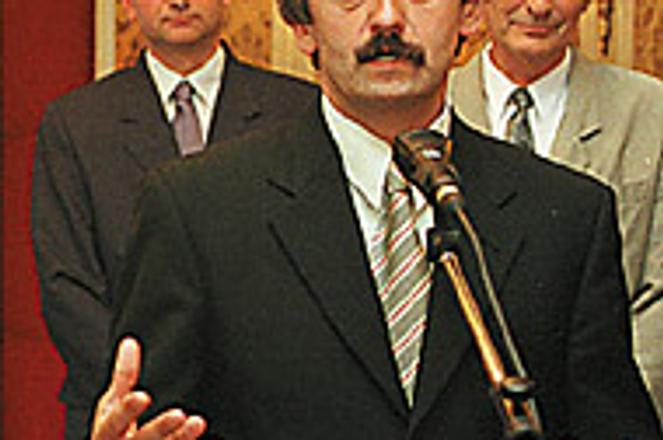TIS's Emilia Sičáková (left) says the government's commitment to fighting corruption is "questionable".photo: TASR
It's been well over a year now since Prime Minister Mikuláš Dzurinda first announced his government's National Fight Against Corruption programme February 28, 2000. But despite promises of a crack-down on corruption, businessmen, analysts and even members of parliament [MPs] say that "almost nothing has changed".
"Corruption still exists, and bribes are paid anywhere where private businesses need state approvals or licences, at customs offices, and so on (see chart, page 2)," said Karol Pavlu, head of the Slovak Entrepreneurs Association (ZPS).
Since Dzurinda announced the anti-corruption programme, he added, disgruntled businessmen have seen little if any improvement. "Vague rules when working with state bodies and a lack of transparency in the state administration still result in frequent corrupt practices."
The government, however, says that criticism of the anti-corruption programme is unfair. Michal Ivantyšyn, the head of the state Communication Department who also sits on the programme's steering committee, said that the programme was working according to schedule.
"Last year the number of persons prosecuted under charges of corruption increased two-fold [from 50 in 1999 to 105 in 2000]," he said April 10. "Those who have been prosecuted probably wouldn't agree that the programme isn't working."
Dzurinda first received a proposal for the anti-corruption programme in November 1999 from corruption watchdog group Transparency International Slovakia (TIS). A year later, the 'action plans' - prepared by ministries and state institutions and featuring some 1,300 points - were approved by cabinet November 22, 2000. Deputy Prime Minister for the Economy Ivan Mikloš blamed the slow progress on a lack of manpower in the ministries.
"The initial preparation alone took far too long," said TIS head Emília Sičáková. Furthermore, she said, a number of the proposed action plans were "too ambiguous, not concrete, lacking set and firm deadlines". For example, she cited the Health Ministry's plan for fighting corruption, which read that it would "keep to the legal norms when registering medical drugs".
Such behaviour, Sičáková said, led her to believe that the Dzurinda government's commitment to fighting corruption "remains questionable."
Sičáková is not alone with her doubts. Peter Tatár, an MP for the coalition Democratic Party, said March 14 for the Národná Obroda daily that it was still common for "state bureaucrats to behave like a god, that his stamp is worth gold."
Added Marek Jakoby, an analyst with the economic think tank Mesa 10 in Bratislava: "The general attitude to this programme seems to be rather relaxed, which renders it ultimately ineffective."
Battle waged?
Ivantyšyn, for his part, defended developments which he says proves the success of the young anti-corruption programme. "The programme's central steering committee has only existed since December 2000, therefore our results are not minimal at all," he said, adding that the business register, which reveals who owns what in Slovakia and which has been on the Internet since January 2001, was another key accomplishment.
Furthermore, the programme committee was preparing a code of ethics for public servants, who he said "should be judged more strictly than common people". The code will become part of a law on state servants, although Ivantyšyn could not say when.
But recent surveys suggest that the anti-corruption programme has resulted in minimal change.
According to a survey of 90 countries conducted by TSI's mother organisation Transparency International in Germany, last year Slovakia ranked 52nd in the 'corruption perception index' (CPI) at 3.5 (10 signifying a corruption free economy, 0 indicating total corruption).
The rating landed Slovakia in the company of countries like Ghana, Senegal and Argentina, and was a drop-off from previous years: in 1998 Slovakia ranked 47th with CPI of 3.9, and in 1999 the country scored 3.7 for 53rd place.
Sičáková said that the index was also referred to as the "index of lost chances" for its ability to influence potential foreign investors and domestic entrepreneurs to put off business investments in the country.
"The slow process of change and the lack of pressure from the cabinet - who pledged to implement the necessary changes - is evident," she said. "Dzurinda's cabinet is in danger of discrediting itself in the eyes of the public."
Perhaps the only positive effect of the Dzurinda government's questioned battle on corruption, observers say, is that the country has finally begun discussing the problem of corruption.
"We have seen the public discussing corruption more than ever," said ZPS's Pavlu. "And awareness of the problem has also risen. But for the reality of the business world, it's still not enough."
The DS's Tatár agreed that corruption was talked about more today than a year ago. But he added that to effectively battle corruption, citizens also need to help.
"The relationship between bureaucrats and citizens must be changed by citizens themselves," he said. "We should not expect that bureaucrats themselves would encourage such changes."

